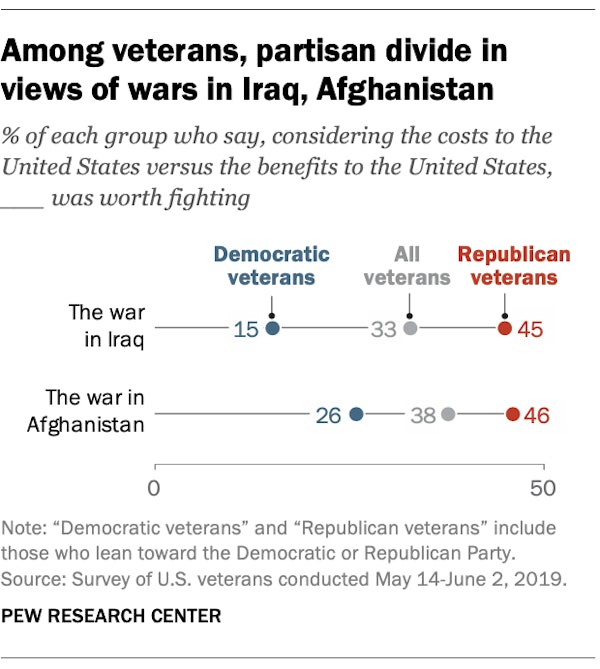Spencer Platt/Getty Images

Most Veterans Say America’s Wars Are a Waste. No One’s Listening to Them.
There's a widening gap between Washington's bipartisan militarism and veterans' bipartisan war-skepticism.
July 12, 2019
In spite of his confused account of U.S. history, his partisan snipes, and his dictatorial posturing, Donald Trump’s parading and speechifying in Washington on July 4 attempted to glom onto one of the last consensus issues in a broken American culture:
We love to support our troops. “We celebrate our history, our people, and the heroes who proudly defend our flag—the brave men and women of the United States military,” Trump told a crowd of mostly VIPs at the Lincoln Memorial.
We love to support our troops. “We celebrate our history, our people, and the heroes who proudly defend our flag—the brave men and women of the United States military,” Trump told a crowd of mostly VIPs at the Lincoln Memorial.
The “Long War” that began on September 11, 2001, added to veterans’ already-outsize role in the American narrative. Worship of military service has become an indispensable cog in every politician’s and corporation’s endearment strategy. But on the actual subject of war, almost no one in mainstream politics is actually listening to “the troops.”
That’s the main takeaway from the Pew Research Center’s latest rolling poll of U.S. veterans, published Thursday, in which solid majorities of former troops said the wars in Iraq, Afghanistan, and Syria were not worth fighting. The gaps between approval and disapproval were not even close to the poll’s 3.9 percent margin of error; barely a third of veterans considered any of those conflicts worthwhile:
Among veterans, 64% say the war in Iraq was not worth fighting considering the costs versus the benefits to the United States, while 33% say it was. The general public’s views are nearly identical: 62% of Americans overall say the Iraq War wasn’t worth it and 32% say it was. Similarly, majorities of both veterans (58%) and the public (59%) say the war in Afghanistan was not worth fighting. About four-in-ten or fewer say it was worth fighting.
Veterans who served in either Iraq or Afghanistan are no more supportive of those engagements than those who did not serve in these wars. And views do not differ based on rank or combat experience.
The only meaningful variation pollsters found among vets was by party identification: Republican-identifying veterans were likelier to approve of the wars. But even a majority of those GOP vets now say the wars were not worth waging.

There simply is no mainstream bloc among politicians of any party that seems interested in heeding that majority opinion. In a rare bout of consistency between 2011 and 2017, private citizen Trump beat a loud drum for withdrawal from Afghanistan—after President Barack Obama, who had campaigned on ending the Iraq war, approved an Afghanistan troop surge and laid the groundwork for U.S. involvement in Syria against ISIS. But like Obama, Trump as president has ended up deepening the U.S. commitments in Afghanistan, as well as adding troops in Syria. Democratic Congresswoman Tulsi Gabbard, an Iraq veteran, earned plaudits from doves and isolationists for pushing an antiwar line in last month’s Democratic presidential debates, and ended up as the debate’s most-searched candidate on Google, a possible reinforcement of the Pew results. But Gabbard has virtually no traction as a presidential candidate, owing to her own flakiness, illiberal record, and coziness with Syria’s perfidious, genocidal dictator, Bashar Al Assad.
Bernie Sanders, of course, is the most mainstream antiwar politician in the U.S., which may help explain his consistently upper-tier showing in presidential preference polls—but neither Gabbard nor Sanders are considered “mainstream” Democrats. In this posited mainstream of American thought, “the Blob”—a motley amalgam of pro-engagement, pro-military national security “experts” advising both parties’ leaders—always wins the day.
Beyond individual politicians, movements for full withdrawal from Syria and Afghanistan—as well as to revoke the 2001 congressional Authorization for the Use of Military Force, a post–September 11 blank check for successive administrations to expand the war on terrorism without bound—have been dead on arrival in Congress, despite their apparent popularity among the electorate. It is almost as if politicians don’t actually care what voters want.
That’s the exact conclusion two political scientists reached in The New York Times this week. Over the past two years, Yale Professor Joshua Kalla and George Washington University Professor Ethan Porter gave U.S. legislators access to constituent polling info on a variety of issues, from mandatory minimum sentencing, gun background checks, and minimum wage to abortion and Obamacare repeal, then polled the lawmakers on what their constituents thought; what they found was that “for most politicians, voters’ views carry almost no weight at all.” This, despite the fact that 87 percent of Americans today say politics are important in their lives, and more Americans than at any time since 1990 say politics are very important to their everyday lives. There is an ever-widening disconnect between the predictable bipartisan militarism of “support the troops” politicians and the surprisingly bipartisan war-skepticism of Americans who have actually served.
That gap is a major motivation behind the recent launch of the Quincy Institute for Responsible Statecraft, a think tank intended to promote “ideas that move U.S. foreign policy away from endless war and toward vigorous diplomacy.” The think tank aims to “invite both progressives and anti-interventionist conservatives to consider a new, less militarized approach to policy,” said cofounder Andrew Bacevich, a former Army colonel (and TNR contributor) whose only son died serving in Iraq. But the organization became immediately controversial on its rollout this week, when it announced its major funders were two of America’s biggest political bogeymen and influencers, left-winger George Soros and right-winger Charles Koch.
It’s unclear whether vilified billionaire donors can solve anything in Washington; another well-funded panel of talking experts may not be the best way to effect a “less militarized approach” in our politically divided atmosphere. But in America’s latest stage of militarized complacency, the Quincy Institute’s bipartisan buy-in more accurately reflects the feelings of voting Americans—veterans, and everybody else—on the wars in Iraq, Afghanistan, and Syria than either the Republican National Committee or the Democratic National Committee. We need to radically redefine what it means to “support the troops,” and we need to start somewhere.
Adam Weinstein is the national security editor for The New Republic. He previously edited for Task & Purpose, Mother Jones, and the Wall Street Journal.


Δεν υπάρχουν σχόλια:
Δημοσίευση σχολίου